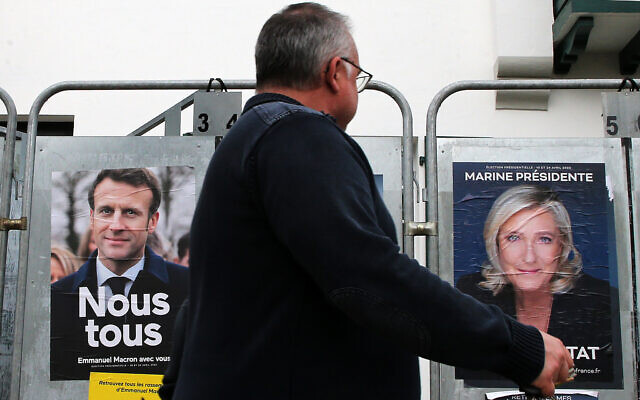PARIS, France — French President Emmanuel Macron Monday embarked on a final fortnight of bruising campaigning against far-right rival Marine Le Pen for a French presidential election run-off whose outcome is far more uncertain than their encounter five years ago.
With final results in, Macron came first in Sunday’s first round of voting with 27.85 percent. Le Pen was second with 23.15 percent. As the top two finishers, they advance to a second round on April 24.
Far-left candidate Jean-Luc Melenchon came close, after a late surge gave him a score of just under 22 percent.
The duel between Macron and Le Pen is a re-run of the 2017 election final from which Macron emerged victorious with 66 percent — but this time polls predict a closer contest that will crucially hinge on voters who backed other candidates in the first round.
Making an aggressive start to the next phase of the campaign, Macron visited Denain, a small town in northern France where he came only third on Sunday behind Le Pen and Melenchon.
“I am here today to convince but also to listen,” said Macron, who is sometimes labeled “president of the rich” by opponents, as he walked in the town.
“I hear the divisions and the splits and it’s my job to rally people around,” he said, adding that he would reach out to all the first-round losers over coming days.
Le Monde daily headlined: “Macron-Le Pen — A more uncertain Act II.”
French far-right party Rassemblement National’s (RN) presidential candidate Marine Le Pen leads a meeting with her campaign staff members, after the final results of the first round of the Presidential election in Paris, on April 11, 2022. (Thomas SAMSON / AFP)
‘Work for it’
Le Pen is set to meet her campaign team before resuming her months-long grassroots efforts in small towns and rural France later in the week.
“A sad repetition,” left-leaning daily Liberation called the Macron-Le Pen duel on Monday, adding: “This time it’s really scary.”
Polls gauging second-round voting intentions mostly point to around 53 percent for Macron and 47 percent for Le Pen.
One poll, however, by the Ifop-Fiducial group suggested Macron could have only a razor-thin win with 51 percent versus 49 percent.
“The second round is the hardest one,” said Finance Minister Bruno Le Maire on RTL radio. “Everything begins again with a new campaign.”
Both candidates will now scramble to woo voters of their defeated first-round rivals.

A man walks past presidential campaign posters of French President Emmanuel Macron and centrist candidate for reelection and French far-right presidential candidate Marine Le Pen in Anglet, southwestern France, April 8, 2022. (AP Photo/Bob Edme)
“We’re going to have to win over the French people who didn’t vote for Emmanuel Macron in the first round,” government spokesman Gabriel Attal told the France Inter broadcaster on Monday.
In an early boost for the president, Communist Party candidate Fabien Roussel, Socialist Anne Hidalgo, Yannick Jadot of the Greens and right-wing Republicans candidate Valerie Pecresse said they would vote for him to prevent the far-right leader coming to power.
Melenchon told his supporters not to give a “single vote” to Le Pen, but stopped short of backing Macron directly.
“If Macron wants to convince our voters, he’s going have to work for it,” said Melenchon’s campaign director, Manuel Bompard.
Meanwhile, Le Pen’s far-right rival Eric Zemmour, who garnered just over seven percent on Sunday, threw his weight behind her.
A pivotal moment in the next stage of the campaign will come on April 20 when the two candidates take part in a live TV debate, just like five years ago when a better-prepared Macron won the day.
But this time will be different, said Brice Tenturier, a political scientist. Macron, he said, “is no longer the new candidate representing a kind of freshness” while Le Pen “is no longer the person people automatically reject.”

Far-right presidential candidate Eric Zemmour gestures during a debate organized by French weekly magazine ‘Valeurs Actuelles’ in Paris, on March 22, 2022. (Alain Jocard/AFP)
‘Critical state’
Part of the battle will be to mobilize the 25 percent of registered voters who abstained in the first round.
The candidates from France’s traditional parties of government — the Socialists and the Republicans — suffered humiliating defeats.
Sunday’s vote spelled disaster for Socialist Hidalgo, the mayor of Paris, who won only 1.75 percent, a historic low for the party which only a decade ago won the presidency.
The vote for the right-wing Republicans party, headed by nominee Valerie Pecresse, collapsed to 4.78 percent from 20 percent in 2017.
On Monday, Pecresse confessed that her campaign finances, which included five million euros ($5.5 million) of her own money, were in a “critical” state, and called for donations from supporters.
Public campaign spending reimbursements are drastically reduced for candidates who fail to reach five percent.

French socialist presidential candidate Anne Hidalgo casts her vote in the first round of the French presidential election in Paris, April 10, 2022. (AP Photo/Lewis Joly)
The election has been overshadowed by the war in Ukraine, with surging prices of everyday goods making the cost of living a key issue.
Its outcome could have major implications for the European Union, which Le Pen says she wants to radically reform. She has also said she wants to pull out of NATO’s joint military command.
While her opponents accuse her of being divisive and racist, Le Pen has sought to project a more moderate image in this campaign and has focused on voters’ daily worries over inflation.
But Macron is expected to target her past proximity with Russian leader Vladimir Putin, her policies on the EU, as well as the cost of her economic program that includes massive tax cuts.

